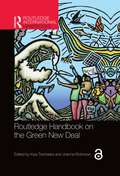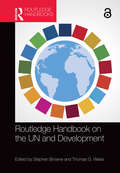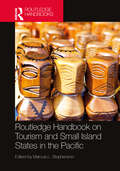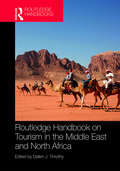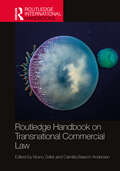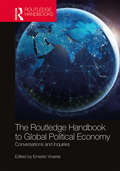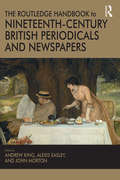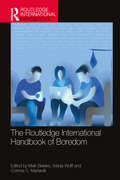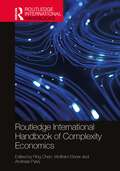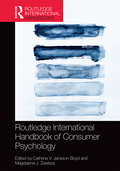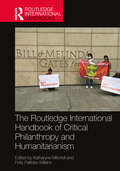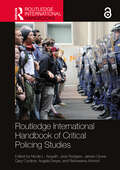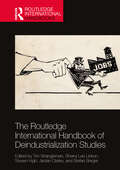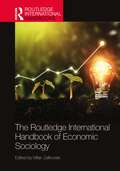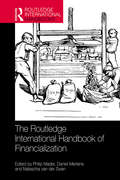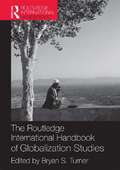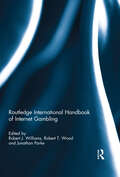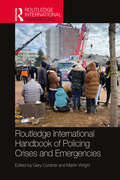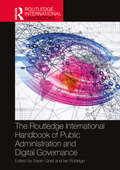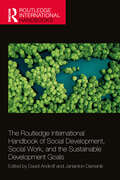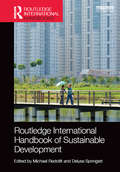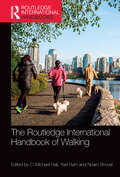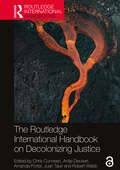- Table View
- List View
Routledge Handbook on the Green New Deal (Routledge International Handbooks)
by Kyla Tienhaara Joanna RobinsonIn recent years, the Green New Deal has moved from relative obscurity to front and centre of policy discussions and public debates about how to respond to the climate crisis. It has been credited with radically changing the nature of the conversation on climate change and with re-energizing the environmental movement at a critical time. All Green New Deal proposals share an emphasis on the need for governments (rather than markets) to lead the energy transition. However, they differ in other respects. This Handbook analyses the fundamentals underlying all Green New Deals as well as exploring national and regional variations. It is divided into three parts. The first part examines the political economy of the Green New Deal focussing not just on how proposals will be costed but also on opportunities for a fundamental transformation of both national economies and the global economic system. The second part explores issues of justice, which are central to many Green New Deal proposals, including Indigenous rights, racial and gender equity, and justice for the Global South. In the third part, authors detail case studies of Green New Deal proposals and plans at the local, national, and regional level. This book will be an invaluable research and reference volume for students and scholars in economics, politics, sociology, geography, and environmental studies. It should also be of interest to those actively involved in climate and environmental policymaking.
Routledge Handbook on the UN and Development
by Thomas G. Weiss Stephen BrowneInternational commissions, academics, practitioners, and the media have long been critical of the UN’s development efforts as disjointed and not fit for purpose; yet the organization has been an essential contributor to progress and peacebuilding. This handbook explores the activities of the UN development system (UNDS), the largest operational pillar of the organization and arguably the arena in which its ideational endeavors have made the biggest contribution to thinking and standards. Contributions focus on the role of the UNDS in sustainable social, economic, and environmental development, describing how the UNDS interacts with the other major functions of the UN system, and how it performs operationally in the context of the new 2030 development agenda focused on the 17 Sustainable Development Goals (SDGs). The volume is divided into three sections: Realizing the SDGs: opportunities and challenges; Resources, partnerships, and management; and Imagining the future of the UN in development. Comprised of chapters by knowledgeable and authoritative UN experts, this book provides cutting-edge and up-to-date research on the strengths and weaknesses of the UNDS, with each chapter focusing on different operational and ideational aspects.
Routledge Handbook on Tourism and Small Island States in the Pacific
by Marcus L. StephensonThis timely handbook critically examines the development and role of tourism in small Pacific Island states located across Melanesia, Micronesia and Polynesia. The volume presents an expansive evaluation of current issues, challenges and potentialities for the 13 self-governing states. Interdisciplinary in coverage and borne of a varied and international authorship, this handbook incorporates 27 specifically commissioned and original contributions. Structured into four thematic sections and embellished with insightful tables and illustrations throughout, the overarching ethos of this volume is to contribute to framing the role of tourism, tourism development and the tourism industry within the context of self-governing Pacific Island states faced with the challenge of pursuing an independent path of development. In doing so, the work highlights and deciphers various tourism development perplexities in the Pacific, examining closely the intersecting sociocultural, geopolitical, environmental, organizational, operational and strategic challenges. This volume, thus, discusses a range of issues: facilitators and inhibitors of tourism growth and development; climate change, ecological concerns, and eco-tourism; non-tourism and undertourism; crisis management and the COVID-19 virus; transportation and tourism infrastructural concerns; tourism policy and planning (including tourism governance); sectoral links between tourism; food and agriculture; gender and micro-entrepreneurship; community management and participation; cultural and natural heritage sites; and the handicraft industry. The work pays critical attention to the various trajectories of sustainable tourism and the United Nations Sustainable Development Goals. Despite the many challenges and concerns raised, the book implicates the importance of good governance, progressive post-COVID-19 recovery strategies and directives, and creative and imaginative options in the successful development, re-development and advancement of tourism. As a definitive reference resource for this subject area, this handbook will be of great interest to students, researchers and academics within tourism, development studies, geography, Pacific studies, sustainability and environmental studies.
Routledge Handbook on Tourism in the Middle East and North Africa
by Dallen J. TimothyThe Routledge Handbook on Tourism in the Middle East and North Africa examines the importance of tourism as a historical, economic, social, environmental, religious and political force in the Middle East and North Africa (MENA). It highlights the ecological and resource challenges related to water, desert environments, climate change and oil. It provides an in-depth analysis of the geopolitical conditions that have long determined the patterns of tourism demand and supply throughout the region and how these play out in the everyday lives of residents and destinations as they attempt to grow tourism or ignore it entirely. While cultural heritage remains the primary tourism asset for the region as a whole, many new types of tourisms are emerging, especially in the Arabian Gulf region, where hyper-development is closely associated with the increasingly prominent role of luxury real estate and shopping, retail, medical tourism, cruises and transit tourism. The growing phenomenon of an expatriate workforce, and how its segregation from the citizenry creates a dual socio-economic system in several countries, is unmatched by other regions of the world. Many indigenous people of MENA keep themselves apart from other dominant groups in the region, although these social boundaries are becoming increasingly blurred as tourism, being one socio-economic force for change, has inspired many nomadic peoples to settle into towns and villages and rely more on tourists for their livelihoods. All of these issues and more shape the foundations of this book. This Handbook is the first of its kind to examine tourism from a broad regional and inclusive perspective, surveying a broad range of social, cultural, heritage, ecological and political matters in a single volume. With a wide range of contributors, many of whom are natives of the Middle East and North Africa, this Handbook is a vital resource for students and scholars interested in Tourism, Middle East Studies and Geography.
Routledge Handbook on Transnational Commercial Law (Routledge International Handbooks)
by Bruno Zeller Camilla Baasch AndersenThis handbook, edited by Zeller and Andersen, is an indispensable contribution to the field of transnational commercial law. With an introduction by Sir Roy Goode, this book presents perspectives on legal issues of international sales transactions as perceived by world leading experts, exposing pragmatic and modern aspects of everything from drafting, to uniform laws to dispute resolution.The book divides itself between fundamental knowledge of transnational commercial law (e.g. chapters on forum shopping, CISG, Cape Town Convention, etc.) and current and topical developments (e.g. chapters on blockchain, smart contracts, metaverse, digital assets, etc.). International or transnational trade during the past 20 years has become more and more important, outstripping domestic trade as a hallmark of economic success. Model laws developed by the United Nations and other international bodies are now being transplanted or ratified by countries, so a translational element must always be considered as part of any choice of law.Addressing a global audience, as the instruments dealt with herein apply to many states in different regions, this handbook aims not only at an undergraduate and graduate student audience but also will interest professional lawyers.
The Routledge Handbook to Global Political Economy: Conversations and Inquiries
by Ernesto VivaresThe Routledge Handbook to Global Political Economy provides a comprehensive guide to how Global Political Economy (GPE) is conceptualized and researched around the world. Including contributions that range from traditional International Political Economy (IPE) to GPE approaches, the Handbook gathers the investigations, varying perspectives and innovative research of more than sixty scholars from all over the world. Providing undergraduates, postgraduates, teachers and researchers with a complete set of traditional, contending and regional perspectives, the book explores current issues, conceptual tools, key research debates and different methodological approaches taken. Structured in five parts methodologically correlated, the book presents GPE as a field of global, regional and national research: • historical waves and diverse ontological axes; • major theoretical perspectives; • beyond traditional perspectives; • regional inquiries; • research arenas. Carefully selected contributions from both established and upcoming scholars ensure that this is an eclectic, pluralist and multidisciplinary work and an essential resource for all those with an interest in this complex and rapidly evolving field of study.
The Routledge Handbook to Nineteenth-Century British Periodicals and Newspapers
by John Morton Andrew King Alexis EasleyProviding a comprehensive, interdisciplinary examination of scholarship on nineteenth-century British periodicals, this volume surveys the current state of research and offers researchers an in-depth examination of contemporary methodologies. The impact of digital media and archives on the field informs all discussions of the print archive. Contributors illustrate their arguments with examples and contextualize their topics within broader areas of study, while also reflecting on how the study of periodicals may evolve in the future. The Handbook will serve as a valuable resource for scholars and students of nineteenth-century culture who are interested in issues of cultural formation, transformation, and transmission in a developing industrial and globalizing age, as well as those whose research focuses on the bibliographical and the micro case study. In addition to rendering a comprehensive review and critique of current research on nineteenth-century British periodicals, the Handbook suggests new avenues for research in the twenty-first century.
The Routledge International Handbook of Boredom (Routledge International Handbooks)
by Maik Bieleke Wanja Wolff Corinna S. MartarelliThis comprehensive text is a unique handbook dedicated to research on boredom. The book brings together leading contributors from across three continents and numerous fields to provide an interdisciplinary exploration of boredom, its theoretical underpinnings, its experiential properties, and the applied contexts in which it occurs.Boredom is often viewed as a mental state with little utility, though recent research suggests that it can be a powerful motivator of human behavior that shapes our actions in many ways. The book examines boredom from a range of perspectives and is comprised of three parts. Part I delves into the theoretical approaches to boredom, presenting methods for its measurement, explaining when and why boredom occurs, and scrutinizing the impact it has on our behavior. Part II focuses on the psychological and neural properties of boredom and its associations with a multitude of mental and interpersonal processes, such as self-control, mind-wandering, flow, and aggression. Part III presents boredom in practical contexts like school and work, and sheds light on its role for health-related behaviors, psychosocial well-being, and aesthetic experiences. The book concludes by summarizing the state of boredom research, identifying promising areas for future research, and providing directions for how research on boredom can be advanced. As the authoritative book on boredom, this handbook is an essential resource for students and researchers of psychology, sociology, education, sport science, and computer science.
Routledge International Handbook of Complexity Economics (Routledge International Handbooks)
by Ping Chen Wolfram Elsner Andreas Pyka Petra Ahrweiler W. Brian Arthur Pete Barbrook-Johnson Frank Beckenbach Michael Benzaquen Thomas Berger Harry Bloch Kristina Bogner Carlo Bottai Jean-Philippe Bouchaud Roy Cerqueti Jing Chen Silvano Cincotti Matteo Cinelli Matteo Coronese Johannes Dahlke John B. Davis Giovanni Dosi Bernd Ebersberger Giovanna Ferraro James K. Galbraith Mauro Gallegati Gaël Giraud Hardy Hanappi Dominik Hartmann Carina I. Hausladen Torsten Heinrich Dirk Helbing César A. Hidalgo Martina Iori Antonio Iovanella Alan Kirman Éva Kuruczleki Linyuan Lü Davide Luzzati Roger A. McCain Sheri M. Markose Stan Metcalfe Matthias Müller Xu Na Karl Naumann-Woleske Marcello Nieddu Anita Pelle Marcelo C. Pereira Flávio L. Pinheiro Marco Raberto Roos, Michael W.M. Hilton L. Root Andrea Roventini Pier Paolo Saviotti Manuel Scholz-Wäckerle Moura, Fernanda Senra de Max Sina Knicker Leilei Shi Y. N. Tang Paul Valcke K. Vela Velupillai Maria Enrica Virgillito Bing-Hong Wang Shuqi Xu Victor M. Yakovenko Marcell Zoltán VéghThe Routledge International Handbook of Complexity Economics covers the historical developments and early concerns of complexity theorists and brings them into engagement with the world today.In this volume, a distinguished group of international scholars explore the state of the art of complexity economics, and how it may deliver new and relevant insights to the challenges of the 21st century. Complexity science started in 1899 when Henri Poincaré described the three-body problem. The first approaches in economics emerged somewhat later, in the 1980s, driven by the Brussels-Austin school. Since then, complexity economics has gone through numerous developments: departing from linear simplifications, applying physical algorithms, to evolutionary economics and big data. This book covers the basic principles and methods, and offers an overview of the various domains—ranging from diverse fields of productivity studies, agricultural economics, to monetary economics—as well as the current challenges such as climate change, epidemics and economic inequality where complexity economics can provide insight. It closes with a review of complexity political economy and policy.Offering a vibrant alternative to orthodox economics, this handbook is a crucial resource for advanced students, researchers and economists across the disciplines of heterodox economics, economic theory and econophysics.
Routledge International Handbook of Consumer Psychology (Routledge International Handbooks)
by Cathrine V. Jansson-Boyd Magdalena J. ZawiszaThis unique handbook maps the growing field of consumer psychology in its increasingly global context. With contributions from over 70 scholars across four continents, the book reflects the cross-cultural and multidisciplinary character of the field. Chapters relate the key consumer concepts to the progressive globalization of markets in which consumers act and consumption takes place.The book is divided into seven sections, offering a truly comprehensive reference work that covers: The historical foundations of the discipline and the rise of globalization The role of cognition and multisensory perception in consumers’ judgements The social self, identity and well-being, including their relation to advertising Social and cultural influences on consumption, including politics and religion Decision making, attitudes and behaviorally based research Sustainable consumption and the role of branding The particularities of online settings in framing and affecting behavior The Routledge International Handbook of Consumer Psychology will be essential reading for anyone interested in how the perceptions, feelings and values of consumers interact with the decisions they make in relation to products and services in a global context. It will also be key reading for students and researchers across psychology and marketing, as well as professionals interested in a deeper understanding of the field.
The Routledge International Handbook of Critical Philanthropy and Humanitarianism (Routledge International Handbooks)
by Katharyne Mitchell Polly Pallister-WilkinsThis handbook builds a shared understanding of the troubling politics of philanthropy and the disturbing history and practices of humanitarianism. While historical work on philanthropy has long suggested a link between imperial rule and humanitarian aid, these insights have only recently been brought to bear on contemporary forms of giving. In this book, contributors link the long history of colonial philanthropy to current foundations and their programs in education, health, migrant care, and other social initiatives. They argue that both philanthropy and humanitarianism often function to consolidate market rule, consolidating and expanding liberal market rationalities of neoliberal entrepreneurialism to a widening population and set of institutions. Philanthropy and humanitarianism share a history, growing together out of modernist socio-economic relations and modes of imperial rule. However, the histories and contemporary politics of the two have not been brought together with such breadth or under such a critical lens before. Discussing philanthropy and humanitarianism together, combining both historical scope and contemporary iterations, highlights continuities and convergences—making the volume a unique introduction and critical overview of critical work in these sister-fields.
Routledge International Handbook of Critical Policing Studies (Routledge International Handbooks)
by Gary Cordner Angela Dwyer Nicole L. Asquith James Clover Jess Rodgers Rishweena AhmedCritical analyses of policing have accompanied accounts of the police since the early days of modern police organisations. More so than ever, police and policing are subject to close and critical scrutiny from governments and the public. It is timely, therefore, to consider what is critical about police and policing.The Routledge International Handbook of Critical Policing Studies brings together scholars and practitioners to critically explore the full continuum of safety governance from police reforms to the redistribution of policing resources to the replacement of state police. In offering the three Rs of policing—reform, redistribute, replace—we provide a conceptualisation of critical policing studies that acknowledges a continuum of policing that mirrors the different trajectories, priorities, and possibilities that exist across different cultural and historical contexts. This collection is composed of 65 scholars and practitioners across 39 chapters, edited by a team of police pracademics and policing scholars, to showcase accounts of policing from outside the Anglo-European metropole, privileging works from First Nations people and from the Global South, and presenting contextualised solutions to the problems facing police and communities.This Handbook identifies the key issues facing the police and safety governance across the globe and offers insights into the implications for policing theory and practice, proposing solutions to some of the most intransigent problems facing contemporary societies. Individually, and as a collection, this Handbook will be an essential read for scholars, practitioners, and activists alike.
The Routledge International Handbook of Deindustrialization Studies (Routledge International Handbooks)
by Tim Strangleman Sherry Lee Linkon Steven High Jackie Clarke Stefan BergerThe Routledge International Handbook of Deindustrialization Studies is a timely volume that provides an overview of this interdisciplinary field that emerged in response to the widespread decline of manufacturing and heavy industry from the 1980s onward. Edited by prominent figures in the field, the volume brings together many of the leading scholars from a range of countries across the globe to offer a multifaceted overview of deindustrialization and its impact. Deindustrialization has been cited as one of the factors behind the rise of the far right, and to a lesser extent the far left, across Europe, the rise and success of Trumpism in the US, and the Brexit vote as well as the more recent and sudden erosion of UK Labour’s ‘Red Wall’ of the North of England. This collection brings together scholars of deindustrialization around the globe and from a wide variety of academic disciplines including history, sociology, politics, geography, economics, anthropology, literature, arts practice, photography, heritage, and cultural studies. In doing so, the volume explores the roots of deindustrialization across the world, highlights the key themes and issues in the field, illustrates the intersectional and interdisciplinary character of the field, and shows how deindustrialization lies at the heart of many of the key political, cultural, social, and economic issues of our time.Written in a clear and accessible style, the Handbook is a comprehensive interdisciplinary volume for this young but maturing field. The volume is a valuable resource for students, teachers, and researchers interested in industrial decline, closure, and the multifaceted impacts they cause. It speaks to readers across the arts, humanities, and social and political sciences concerned with deindustrialization broadly defined.
The Routledge International Handbook of Economic Sociology (Routledge International Handbooks)
by Milan ZafirovskiThis handbook presents a systematic and comprehensive overview of economic sociology, an exemplary interdisciplinary field which draws on theoretical frameworks and empirical findings from both economics and sociology to present a unique lens on the interdependence of the economy and society. The handbook is arranged in four parts which together present the current state-of-the-art of economic sociology as well as pointing toward future directions for research. The first part outlines the theoretical foundations of economic sociology and its relations to other fields, particularly with regard to other alternative approaches to economics, and looks at conceptions and definitions of economic sociology vary. The second part provides an overview of the historical development of economic sociology from classical political economy to the present day. The third part explores the main problematics of economic sociology, analyzing the economy in relation to particular social institutions, the state, ideology, culture and art, religion, gender, race/ethnicity, and more. The fourth part focuses on the principal branches including sociology of the market, industrial organization and work, uncertainty, distribution and inequality, money and finance, and the environment. The stellar international cast of contributors is drawn from both economics and sociology, therefore presenting a holistic view of the field and contributing to a rejuvenation of economic sociology within economics. It is an indispensable reference work for researchers and students across a broad range of sociological and economic disciplines.
The Routledge International Handbook of Financialization (Routledge International Handbooks)
by Philip Mader Daniel Mertens Natascha Van Der ZwanFinancialization has become the go-to term for scholars grappling with the growth of finance. This Handbook offers the first comprehensive survey of the scholarship on financialization, connecting finance with changes in politics, technology, culture, society and the economy. It takes stock of the diverse avenues of research that comprise financialization studies and the contributions they have made to understanding the changes in contemporary societies driven by the rise of finance. The chapters chart the field’s evolution from research describing and critiquing the manifestations of financialization towards scholarship that pinpoints the driving forces, mechanisms and boundaries of financialization. Written for researchers and students not only in economics but from across the social sciences and the humanities, this book offers a decidedly global and pluri-disciplinary view on financialization for those who are looking to understand the changing face of finance and its consequences.
The Routledge International Handbook of Globalization Studies: Second Edition (Routledge International Handbooks)
by Bryan S. TurnerThe Routledge International Handbook of Globalization Studies offers students clear and informed chapters on the history of globalization and key theories that have considered the causes and consequences of the globalization process. There are substantive sections looking at demographic, economic, technological, social and cultural changes in globalization. The handbook examines many negative aspects – new wars, slavery, illegal migration, pollution and inequality – but concludes with an examination of responses to these problems through human rights organizations, international labour law and the growth of cosmopolitanism. There is a strong emphasis on interdisciplinary approaches with essays covering sociology, demography, economics, politics, anthropology and history. The Handbook, written in a clear and direct style, will appeal to a wide audience. The extensive references and sources will direct students to areas of further study.
Routledge International Handbook of Internet Gambling
by Robert J. Williams Robert T. Wood Jonathan ParkeInternet gambling is a rapidly growing phenomenon, which has profound social, psychological, economic, political, and policy implications. Until recently, Internet gambling has been understudied by the research community, but now a growing body of literature is emerging, on all aspects of Internet gambling and its attendant implications. As jurisdictions around the world grapple to understand the best way to respond to Internet gambling from a commercial, regulatory, and social perspective, scholarly studies of Internet gambling are becoming an ever more crucial resource. The Handbook of Internet Gambling consolidates this emerging body of literature into a single reference volume. Its twenty chapters comprise groundbreaking contributions from the world’s leading authorities in the commercial, clinical, political and social aspects of Internet gambling. It is sure to be a foundational resource for academics, students, regulators, politicians, policy makers, commercial providers, and health care professionals who have an interest in understanding the history, dynamics, and impacts of Internet gambling in a global context.
Routledge International Handbook of Investigative Interviewing and Interrogation (Routledge International Handbooks)
by Dave Walsh, Ray Bull and Igor ArehThis handbook provides readers with coverage of the various interview and interrogation techniques used across the world with victims, witnesses, and suspected offenders. It includes exclusive coverage on countries rarely, if ever, previously reported upon in the literature to any substantive depth.Bringing together a collection of chapters from over 40 countries, this handbook advises and explains the practices used in crime interviewing and informs the reader of contemporary developments hitherto unreported in any current book on interviewing and interrogation. In doing so, the Routledge International Handbook of Investigative Interviewing and Interrogation showcases global exemplars of evidence-based practice informed by scientific research. Building on recent research, including protocols developed in a variety of countries, this book is particularly timely in the wake of the "Méndez Principles", a set of principles developed by the UN (i) to counter the ill-treatment of suspects during police questioning and (ii) to gather more reliable information.This handbook will be an essential reference text across criminology, criminal justice, policing and investigation studies, and law.
Routledge International Handbook of Policing Crises and Emergencies (Routledge International Handbooks)
by Gary Cordner Martin WrightThis handbook explores those occasions when the police are faced with a public, national, or international crisis and are expected to continue to serve. It provides a unique, scholarly, and international overview on policing crises and emergencies, addressing the different contexts and challenges of working in extraordinary circumstances, dealing with unfamiliarity, and working with and alongside other agencies, as well as the significant political and public requirement to return as quickly as possible to normality. Sections include coverage of:• Policing disasters• Policing public health emergencies• Policing political protest• Policing terror and conflict• Policing mass violence• Policing extreme crises and emergenciesEach section is filled with a variety of international case studies examining best practice in the policing context, together with a scene-setting chapter tying together key theoretical and conceptual concepts. It is essential reading for all engaged with professional policing, law enforcement, and public order.
The Routledge International Handbook of Public Administration and Digital Governance (Routledge International Handbooks)
by Sarah Giest Ian RobergeThe Routledge Handbook of Public Administration and Digital Governance is a comprehensive, cutting-edge guide for students, scholars, practitioners of public policy, public administration and digital governance.The book demonstrates the diverse nature of "digital government" through a series of case studies from different regions across the globe, including Africa, the Americas, Asia and Europe. The book uses these cases to highlight various aspects and implications of the intersection of digital technologies and public administration. These include impact of practices and principles of public administration, the effects of particular technologies/tools and the relationship between state and citizen. The book also addresses barriers and enablers to the adoption of digital technology, with select chapters focusing on artificial intelligence (AI) in governmental contexts by leading practitioners and scholars. Rather than providing region-specific lessons, the cases identify common challenges, offering a more holistic understanding of public administration in the digital era.With contributions from both practitioners and scholars, this handbook will be a compelling resource for those researching, studying or working in public administration, public leadership, information systems, political science and other related fields.
The Routledge International Handbook of Social Development, Social Work, and the Sustainable Development Goals (Routledge International Handbooks)
by David Androff Janianton DamanikThe Routledge International Handbook of Social Development, Social Work, and the Sustainable Development Goals answers the question: What is the contribution of social development and social work to the Sustainable Development Goals? The success of these goals requires implementation, and each of the 17 objectives for sustainable social progress have a social dimension. The Sustainable Development Goals (SDGs), like the Millennium Development Goals (MDGs) before them, were born of a larger social development movement which over the last 25 years has become increasingly mainstream in the fields of international development, sustainability, and social work. These practitioners are essential to the implementation of the SDGs. This handbook examines how the SDGs are being implemented in diverse contexts. No previous work has surveyed social development and social work’s contribution to the SDGs nor represented voices from the Global South on the SDGs. This book broadens the current literature by focusing on key sites throughout the Global South and featuring underrepresented voices from Africa, Asia, and Latin America. These regions are vitally important to assessing the SDGs, as this is where innovative social development projects are occurring, and where social workers are playing a leading role in achieving the SDGs. The book is divided into eight parts: • Context of Social Development, Social Work, and the SDGs • Perspectives on the SDGs • Case Studies on Engagement with the SDG Agenda • Case Studies on Ending Poverty • Case Studies on Health and Well-Being • Case Studies on Gender Equality • Case Studies on Climate and Sustainability • Case Studies on Governance, Peace, and Justice It comprises 35 newly written chapters by 74 authors. It will be of interest to a broad interdisciplinary audience of scholars, educators, and students in the fields of social development, social welfare, social work, social policy, human rights, international relations, political science, international affairs, sustainability, community development, area studies, and development studies.
Routledge International Handbook of Sustainable Development (Routledge International Handbooks)
by Michael Redclift Delyse SpringettThis Handbook gives a comprehensive, international and cutting-edge overview of Sustainable Development. It integrates the key imperatives of sustainable development, namely institutional, environmental, social and economic, and calls for greater participation, social cohesion, justice and democracy as well as limited throughput of materials and energy. The nature of sustainable development and the book’s theorization of the concept underline the need for interdisciplinarity in the discourse as exemplified in each chapter of this volume. The Handbook employs a critical framework that problematises the concept of sustainable development and the struggle between discursivity and control that has characterised the debate. It provides original contributions from international experts coming from a variety of disciplines and regions, including the Global South. Comprehensive in scope, it covers, amongst other areas: Sustainable architecture and design Biodiversity Sustainable business Climate change Conservation Sustainable consumption De-growth Disaster management Eco-system services Education Environmental justice Food and sustainable development Governance Gender Health Indicators for sustainable development Indigenous perspectives Urban transport The Handbook offers researchers and students in the field of sustainable development invaluable insights into a contested concept and the alternative worldviews that it has fostered.
The Routledge International Handbook of Walking: Leisure, Travel And Wellbeing
by C. Michael Hall Yael Ram Noam ShovalWalking is an essentially human activity. From a basic means of transport and opportunity for leisure through to being a religious act, walking has served as a significant philosophical, literary and historical subject. Thoreau’s 1851 lecture on Walking or the Romantic walks of the Wordsworths at Grasmere in the early 19th Century, for example, helped create a philosophical foundation for the importance of the act of walking as an act of engagement with nature. Similarly, and sometimes inseparable from secular appreciation, pilgrimage trails provide opportunities for finding self and others in the travails of the walk. More recently, walking has been embraced as a means of encouraging greater health and well-being, community improvement and more sustainable means of travel. Yet despite the significance of the subject of walking there is as yet no integrated treatment of the subject in the social science literature. This handbook therefore brings together a number of the main themes on the study of walking from different disciplines and literatures into a single volume that can be accessed from across the social sciences. It is divided into five main sections: culture, society and historical context; social practices, perceptions and behaviours; hiking trails and pilgrimage routes; health, well-being and psychology; and method, planning and design. Each of these highlights current approaches and major themes in research on walking in a range of different environments. This handbook carves out a unique niche in the study of walking. The international and cross-disciplinary nature of the contributions of the book are expected to be of interest to numerous academic fields in the social and health sciences, as well as to urban and regional planners and those in charge of the management of outdoor recreation and tourism globally.
The Routledge International Handbook on Decolonizing Justice (Routledge International Handbooks)
by Chris Cunneen Antje Deckert Amanda Porter Juan Tauri Robert WebbThe Routledge International Handbook on Decolonizing Justice focuses on the growing worldwide movement aimed at decolonizing state policies and practices, and various disciplinary knowledges including criminology, social work and law. The collection of original chapters brings together cutting-edge, politically engaged work from a diverse group of writers who take as a starting point an analysis founded in a decolonizing, decolonial and/or Indigenous standpoint. Centering the perspectives of Black, First Nations and other racialized and minoritized peoples, the book makes an internationally significant contribution to the literature. The chapters include analyses of specific decolonization policies and interventions instigated by communities to enhance jurisdictional self-determination; theoretical approaches to decolonization; the importance of research and research ethics as a key foundation of the decolonization process; crucial contemporary issues including deaths in custody, state crime, reparations, and transitional justice; and critical analysis of key institutions of control, including police, courts, corrections, child protection systems and other forms of carcerality. The handbook is divided into five sections which reflect the breadth of the decolonizing literature: • Why decolonization? From the personal to the global • State terror and violence • Abolishing the carceral • Transforming and decolonizing justice • Disrupting epistemic violence This book offers a comprehensive and timely resource for activists, students, academics, and those with an interest in Indigenous studies, decolonial and post-colonial studies, criminal legal institutions and criminology. It provides critical commentary and analyses of the major issues for enhancing social justice internationally.
The Routledge International Handbook on Decolonizing Justice (Routledge International Handbooks)
by Chris Cunneen Antje Deckert Amanda Porter Juan Tauri Robert WebbThe Routledge International Handbook on Decolonizing Justice focuses on the growing worldwide movement aimed at decolonizing state policies and practices, and various disciplinary knowledges including criminology, social work and law. The collection of original chapters brings together cutting-edge, politically engaged work from a diverse group of writers who take as a starting point an analysis founded in a decolonizing, decolonial and/or Indigenous standpoint. Centering the perspectives of Black, First Nations and other racialized and minoritized peoples, the book makes an internationally significant contribution to the literature.The chapters include analyses of specific decolonization policies and interventions instigated by communities to enhance jurisdictional self-determination; theoretical approaches to decolonization; the importance of research and research ethics as a key foundation of the decolonization process; crucial contemporary issues including deaths in custody, state crime, reparations, and transitional justice; and critical analysis of key institutions of control, including police, courts, corrections, child protection systems and other forms of carcerality.The handbook is divided into five sections which reflect the breadth of the decolonizing literature:• Why decolonization? From the personal to the global• State terror and violence• Abolishing the carceral• Transforming and decolonizing justice• Disrupting epistemic violenceThis book offers a comprehensive and timely resource for activists, students, academics, and those with an interest in Indigenous studies, decolonial and post-colonial studies, criminal legal institutions and criminology. It provides critical commentary and analyses of the major issues for enhancing social justice internationally.The Open Access version of this book, available at www.taylorfrancis.com, has been made available under a Creative Commons Attribution-Non Commercial-No Derivatives 4.0 license.
